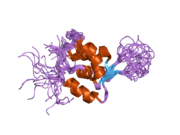Biology:FOXK1
 Generic protein structure example |
Forkhead box protein K1 is a transcription factor of the forkhead box family that in humans is encoded by the FOXK1 gene.[1][2]
During starvation, in type 2 diabetes, in rapidly dividing cells during embryogenesis, in tumors (Warburg effect) and during T cell proliferation, aerobic glycolysis is induced to produce the building block to sustain growth. FOXK1 is one of the transcription factors managing the passage from the normal cellular respiration (complete glucose oxidation) to generating ATP and intermediaries for many other biochemical pathways.[3]
FOXK1 and its closely relate sibling FOXK2 induce aerobic glycolysis by upregulating the enzymatic machinery required for this (for example, hexokinase-2, phosphofructokinase, pyruvate kinase, and lactate dehydrogenase), while at the same time suppressing further oxidation of pyruvate in the mitochondria by increasing the activity of pyruvate dehydrogenase kinases 1 and 4. Together with suppression of the catalytic subunit of pyruvate dehydrogenase phosphatase 1 this leads to increased phosphorylation of the E1α regulatory subunit of the pyruvate dehydrogenase complex, which in turn inhibits further oxidation of pyruvate in the mitochondria—instead, pyruvate is reduced to lactate. Suppression of FOXK1 and FOXK2 induce the opposite phenotype. Both in vitro and in vivo experiments, including studies of primary human cells, show how FOXK1 and/or FOXK2 are likely to act as important regulators that reprogram cellular metabolism to induce aerobic glycolysis.[3]
References
- ↑ "Identification and characterization of human FOXK1 gene in silico". Int J Mol Med 14 (1): 127–32. Jun 2004. doi:10.3892/ijmm.14.1.127. PMID 15202027.
- ↑ "Entrez Gene: FOXK1 forkhead box K1". https://www.ncbi.nlm.nih.gov/sites/entrez?Db=gene&Cmd=ShowDetailView&TermToSearch=221937.
- ↑ 3.0 3.1 Sukonina, Valentina; Ma, Haixia; Zhang, Wei; Bartesaghi, Stefano; Subhash, Santhilal; Heglind, Mikael; Foyn, Håvard; Betz, Matthias J. et al. (Jan 2019). "FOXK1 and FOXK2 regulate aerobic glycolysis". Nature 566 (7743): 279–283. doi:10.1038/s41586-019-0900-5. ISSN 1476-4687. PMID 30700909. Bibcode: 2019Natur.566..279S.
Further reading
- "Large-scale mapping of human protein-protein interactions by mass spectrometry.". Mol. Syst. Biol. 3 (1): 89. 2007. doi:10.1038/msb4100134. PMID 17353931.
- "Global, in vivo, and site-specific phosphorylation dynamics in signaling networks.". Cell 127 (3): 635–48. 2006. doi:10.1016/j.cell.2006.09.026. PMID 17081983.
- "Crystal structure of the human FOXK1a-DNA complex and its implications on the diverse binding specificity of winged helix/forkhead proteins.". J. Biol. Chem. 281 (25): 17400–9. 2006. doi:10.1074/jbc.M600478200. PMID 16624804.
- "The status, quality, and expansion of the NIH full-length cDNA project: the Mammalian Gene Collection (MGC).". Genome Res. 14 (10B): 2121–7. 2004. doi:10.1101/gr.2596504. PMID 15489334.
- "Identification and characterization of a novel human FOXK1 gene in silico.". Int. J. Oncol. 25 (3): 751–7. 2005. doi:10.3892/ijo.25.3.751. PMID 15289879.
- "Complete sequencing and characterization of 21,243 full-length human cDNAs.". Nat. Genet. 36 (1): 40–5. 2004. doi:10.1038/ng1285. PMID 14702039.
- "The DNA sequence of human chromosome 7.". Nature 424 (6945): 157–64. 2003. doi:10.1038/nature01782. PMID 12853948. Bibcode: 2003Natur.424..157H.
- "Generation and initial analysis of more than 15,000 full-length human and mouse cDNA sequences.". Proc. Natl. Acad. Sci. U.S.A. 99 (26): 16899–903. 2003. doi:10.1073/pnas.242603899. PMID 12477932. Bibcode: 2002PNAS...9916899M.
 |



